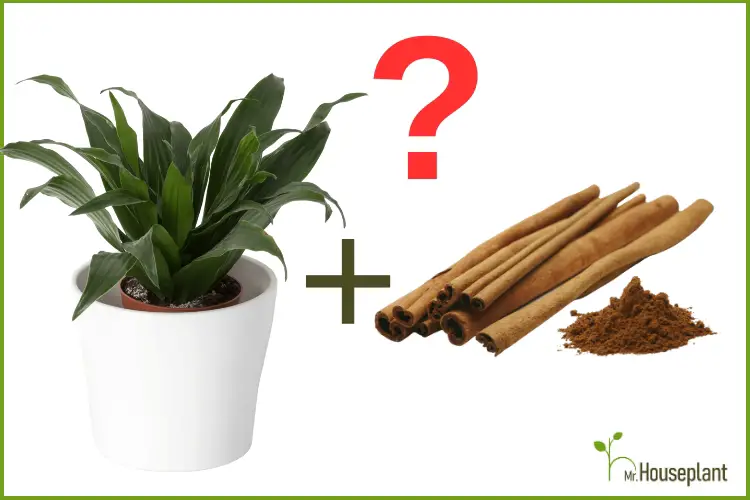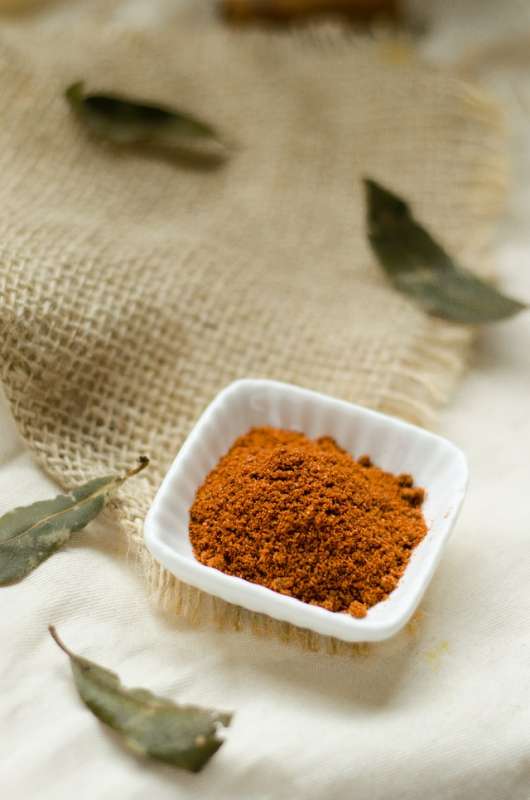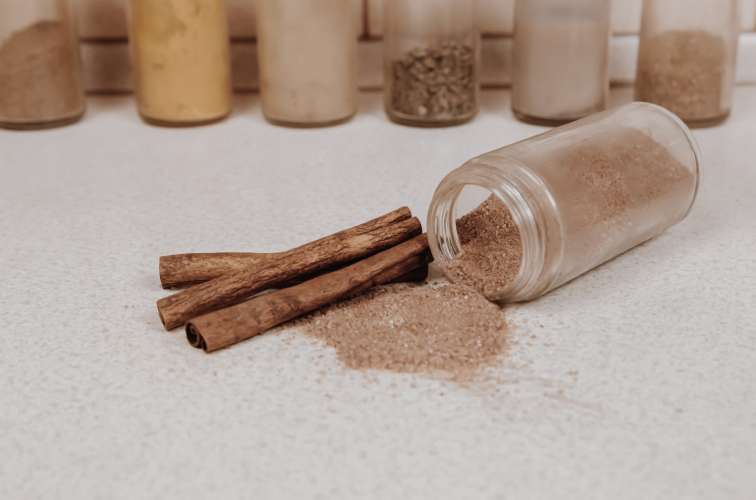
Have you ever used cinnamon to treat your houseplants?
Some people use cinnamon for a variety of issues that can come up with their houseplants — to get rid of fungus gnats, different bugs, as a fungicide, over cut tissue when taking cuttings to prevent rot, to help cuttings root, to get rid of ants, or to remove mold from topsoil.
Some swear in its effectiveness, while others say that they didn’t see any difference after using cinnamon on their houseplants, or that they learned the hard way that cinnamon doesn’t help plants, and even can cause tissue damage if put directly on the plant.
The cold, hard truth is — there aren’t any scientific studies that support claims that cinnamon is beneficial for houseplants in any way. Although I don’t use cinnamon to treat my houseplants and always go for the proven stuff, I don’t think experimenting and having fun with your plants is bad. So, if you enjoy experimenting or using cinnamon on your houseplants makes you happy, no judgment here — please, go ahead!
In cases of urgency (diseases, a dying plant, etc.) I strongly suggest using scientifically-backed products that are proven to work.
To understand why claims that cinnamon is beneficial for houseplants are nothing but a myth (as things currently stand), delve further into this article.
Cinnamon is a powder formed by grinding bark from a number of different trees in the genus Cinnamomum. There are more than 300 species in this genus and at least 4 or 5 are used to make cinnamon.
However, not all cinnamon is created equal.
You have probably heard or read about “true” and “fake” cinnamon, as well as about comparisons between the two. But actually, there are several so-called fake cinnamon kinds — cassia (Cinnamomum aromaticum and Cinnamonum cassia) or Chinese, while Sri Lanka or Ceylon is considered the real thing.
When you go to your local store to get cinnamon, the problem is, you can buy only cinnamon — labels do not specify the kind, except for Ceylon cinnamon, which is much more expensive.
So, when thinking about a type of cinnamon to use to treat your plants, you can probably choose only between the common cinnamon and the more expensive Ceylon. If you reach for the pricier option, you may believe it will benefit your plant better, but the truth is that science doesn’t support this theory.
Cinnamon Powder Studies Conducted on Plants
There aren’t any scientific studies or research on the effect of cinnamon powder on actual potted houseplants.
Some studies I’ve read so far do show that several cinnamon components have some antifungal properties.
However, keep in mind that:⠀
- The studies weren’t conducted on actual plants. A lot of the studies were in vitro, meaning that cinnamon was tested on fungi in test tubes or Petri dishes. I haven’t found any studies where the dry cinnamon powder was sprinkled on soil or where cuttings were dipped in cinnamon, which is how people mainly use it to treat their houseplants.
- The studies that were actually conducted on plants, weren’t conducted on the species we commonly grow at home, like monsteras, pileas, snake plants, etc. Most studies were conducted in vitro; for example, one study was conducted on tomatoes. ⠀
- The fungi tests usually weren’t taken on the same kind of fungi that kills the houseplants we usually grow. ⠀
- The cinnamon form used in studies is not the same one houseplant parents use at home. A lot of studies were conducted using essential oils, water extracts, or alcohol extracts, while houseplant parents mostly use a powdered form which was shown to be less effective.⠀
- It is not certain if the studies were conducted with the same cinnamon species that we use at home. A lot of studies do not specify the species used, and most times when we buy cinnamon in a supermarket, the label doesn’t list which species it belongs to.
One study found that Cinnamomum Verum, also known as Cinnamomum Zeylanicum, is the most effective. However, none of the studies I’ve seen so far were done on actual houseplants, using the powdered form of cinnamon, of the same species we buy in supermarkets, used in the same way people are applying it to houseplants and soil.
Cinnamon as Antifungal and Its Properties
Even though some people in the houseplant community like using cinnamon to treat their plants, there aren’t any scientific studies confirming that cinnamon is an effective antifungal for houseplants.

Many of the studies that examined cinnamon’s antifungal properties were in vitro tests that examined the effect of cinnamon on fungi growing in Petri dishes; there was no soil or seedlings involved. These tests indeed showed antifungal properties of cinnamon. However, we cannot simply assume that similar results would be acquired with actual houseplants, under different circumstances, on different types of fungi.
My recommendation — If you want to control the spread of fungal diseases in your houseplants, I suggest you use a fungicide; they have been scientifically tested and proven to work.
What to use instead of cinnamon — To get rid of ants I suggest using Boric acid.
Does Cinnamon Help with Rooting Cuttings?
Cinnamon of any kind does not contain rooting hormones and thus cannot cause or stimulate roots to form.
It may help prevent fungal infections (which can be beneficial for rooting cuttings), but this is not scientifically proven on plants, as mentioned above.
Is It Worth Getting Cinnamon Instead of Rooting Hormone?
If you want real results, my answer is — no, it’s not worth it. Cinnamon will most likely not help your houseplants root any faster than they would on their own. In short, there is still a lot of research to be done before we can say with certainty that cinnamon does work as antifungal, or as a rooting powder for houseplants.
Note that the majority of houseplants can root on their own, considering they have enough light, and without any rooting remedy, so you can always try rooting without any commercial or natural products.
What to use instead of cinnamon — But if you run into difficulties, and you want to improve your plant’s chances of successful rooting, I recommend buying a rooting hormone.
Does Cinnamon Kill Ants?
A study in the International Journal of Scientific and Research Publications revealed that cinnamon essential oil can be used to both repel and exterminate ants but getting rid of ants in houseplants using cinnamon powder was not mentioned.
A Cornell study showed that cinnamon essential oil can help deter some insects like mosquitoes and various pests, but the list does not include ants.
If you do decide to use cinnamon essential oil to get rid of ants, make sure to dilute it so you don’t harm your plant. And if you decide to try using cinnamon powder to help you kill ants, let me know your experience in the comments.
What to use instead of cinnamon — To get rid of ants I suggest using Boric acid.
Is It True that Cinnamon Heals Plant Wounds?
Like you, I also often run into online articles claiming that simply dusting cinnamon powder on the wound of a plant can encourage healing and prevent fungal infections.

It is true that cinnamon is high in cinnamaldehyde, which is considered to be the source of most of its health benefits and helps fight various types of infection. However, the evidence is limited it reduces infections on cuttings as there weren’t any tests conducted on potted houseplants.
You are free to experiment :) But if you’re trying to root an expensive houseplant like a monstera albo or philodendron ‘pink princess’, I would personally rather go with something that was scientifically proven to work and will increase my chances of success.
What to use instead of cinnamon — To help reduce chances of infection on your houseplants, use a fungicide.
Does Cinnamon Work against Fungus Gnats in Plants?
Some houseplant parents believe that sprinkling dry powdered cinnamon on the top layer of soil can help them get rid of gnats in houseplants. Although the antifungal and antimicrobial properties of cinnamon have been supported by science, we can’t yet be sure that cinnamon can, in actual fact, control gnats in houseplants.
Some plant parents report that cinnamon powder didn’t stop adult gnats from laying eggs. In fact, after they mixed cinnamon into the top layer of the soil in the pot, they still continued to see gnat larvae.
What to use instead of cinnamon — To get rid of gnats in houseplants, instead of using cinnamon, I recommend using Mosquito Bits in combination with yellow sticky notes. Or using a systemic insecticide that will also help you get rid of most other pests for a full year! Or you can read my full post on 11 methods of getting rid of fungus gnats.
Essential Oils vs Cinnamon Powder
In the Cinnamon powder: an in vitro and in vivo evaluation of antifungal and plant growth-promoting activity study, published in the European Journal of Plant Pathology, the effects of organic powder of Cinnamomum zeylanicum on tomato plants were observed and evaluated (please note — on tomatoes, not on houseplants).
Cinnamon’s antifungal activity, potential to inhibit fungal growth, and overall stimulating effect on tomato plants were proved. It was proved that cinnamon powder has the potential to inhibit B. cinerea growth and also has a stimulating effect on tomato plants. The study also concluded that cinnamon water filtrates were as effective as cinnamon oil.
Cinnamon extract or liquid cinnamon is more concentrated than cinnamon powder while cinnamon essential oil (Cinnamon Bark Essential Oil) is collected directly from the bark and is far more potent than both and needs to be used with caution.
When compared, the cinnamon essential oil has been proven in vitro tests to be more effective than cinnamon powder.
Although direct benefits of either cinnamon essential oil or cinnamon powder on houseplants are not supported by science, some houseplant parents may still try using either to boost or protect their plants. If you decide to use essential oil, please be careful, you could harm your plant if you don’t dissolve the oil.
Should You Use Cinnamon to Treat Your Plants
Let’s say you buy a $300 Monstera cutting.
Do you want to dip it in cinnamon, which might work, but not necessarily?
Or would you rather dip it in a rooting hormone, which scientific studies have proven as beneficial? Which one do you think actually increases your chances of success?
It all comes down to your affinities, time, and money.
As you can see, I exclusively trust science and scientific research but my approach to houseplant care is flexible. I also believe you should experiment, have fun, and do things you enjoy if you don’t harm your plants or yourself in the process. :)
But know that there is currently not much science to back up the effectiveness of cinnamon on houseplants the way people usually use it these days. And there are risks as well. In one study, a species of tomatoes was actually negatively affected by the application of cinnamon.⠀
Personally, I use fungicides and rooting powders, not cinnamon, but I may change my mind and try cinnamon if I see scientific research that examines the effect of the powdered form of cinnamon, of the same species we buy in supermarkets, used in the same way people apply it to actual potted houseplants.⠀
If, in the end, you still decide to go with cinnamon, I suggest cinnamon essential oil rather than powder, as it has been proven to be more effective, at least in vitro tests.
In case you have any additional questions, let me know in the comments below.
Yours Truly,



I liked the article. As i get into plants more, I do see that some have exceptional qualities. I didnt know if cinnamon was one of those plants. Science is forever evolving and can do wonders in the ability to produce nutrients that can sustain plant life. I just think the less chemicals we use in our plants and ourselves the better off we will be.
I would of liked it if you would of cited the studies…gives more credit to your opinion. Cheers
Hi Heck, I agree, the less artificial chemicals we use, the better. And thank you so much for the suggestion, you are right. When I revise the article, I will list the studies that I found for this article.
Thanks for debunking this myth. I have indoor plants with small flies. I’ve watched the flies just walk over the cinnamon like dirt. I don’t know if it’s a type of cinnamon or a combination of cinnamon with something else but as it stands, there’s way better ways to eliminate bugs.
My pleasure Nick 🙂
My understanding is that cinnamon doesn’t kill the fungus gnats (small flies) but it does kill/prevent the fungus that their larvae eat. In theory, it prevents an infestation.
I have had luck ONLY with Ceylon cinnamon. Wipes out fungus and the gnats while keeping sensitive plants safe. I also spray a Ceylon cinnamon tea on my window box plants to keeps bugs away. Seems to work!
Hi RaBee, that’s great! I’m glad it’s been working out for you. You should continue with it. I encourage people to experiment and try different things. Since it’s difficult for me to recommend a specific cinnamon product, as often times we don’t know which type of cinnamon is in a bottle, that’s why I recommend other products for rooting or fungus gnats. Thank you for sharing your experience! 😊
I always wondered about the benefits of using cinnamon for my houseplants.
Your clarity on the topic is much appreciated. Really enjoyed reading this article.
Thank you so much 🙂
After battling against ants in my conservatory and even in my kitchen and having tried all the recommended chemicals for years , I finally got rid of them after sprinkling cinnamon on the soil of potted plants .Not seen one in months.
Hi Annie, thank you for sharing. Would you mind sharing which cinnamon you uses? Does the packaging list the cinnamon species? Thanks 🙂
I was given a large quantity of cinnamon that came from Morocco . I don’t know what species it was .No markings on the package. I have since bought Ceylon cinnamon on line from. : http://www.akospices.com and it seems to carry on the good job.Moreover, the plants that I have treated seemed to flourish though I refrain to treat orchids with it as they are very particular.